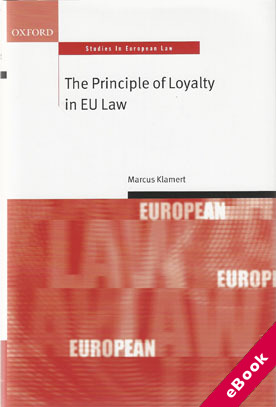
The device(s) you use to access the eBook content must be authorized with an Adobe ID before you download the product otherwise it will fail to register correctly.
For further information see https://www.wildy.com/ebook-formats
Once the order is confirmed an automated e-mail will be sent to you to allow you to download the eBook.
All eBooks are supplied firm sale and cannot be returned. If you believe there is a fault with your eBook then contact us on ebooks@wildy.com and we will help in resolving the issue. This does not affect your statutory rights.
Despite its seemingly innocuous wording, in what is now Article 4 (3) TEU, the principle of loyalty has had a significant impact in deepening the reach of EU law within the Member States.
The duty of sincere cooperation has been interpreted strongly by the European Courts as imposing serious duties on States to give strong effect to European legal acts. The principle has been central to the development of Union law since the 1960s, and is still being relied on by the European Court of Justice to often-controversial effect.
Providing a thorough discussion of the principle of loyalty in EU law, this book introduces a novel classification of the very diverse roles loyalty plays in the EU. It distinguishes between the effects loyalty prescribes for interlocking the legal orders of the Member States with Union law, its application in preventing and resolving conflicts between the Union and the Member States, and the loyalty principle's role in the shaping of EU law.
It addresses important and yet unresolved questions pertaining to loyalty, such as its relation to the principles of solidarity, pre-emption, the Union interest, institutional balance, and the unity of international representation. The book explains why loyalty has been neglected in the prevailing narratives about the foundational case law of the European Court of Justice, and highlights its central importance to understanding EU public law.